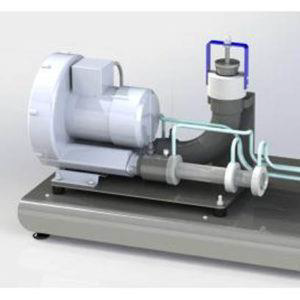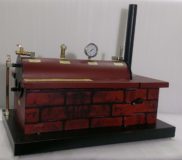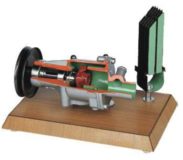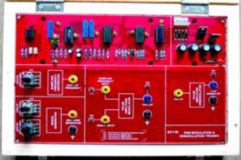COMPRESSIBLE FLOW STUDY BENCH Model FM 76
Home » Products » COMPRESSIBLE FLOW STUDY BENCH Model FM 76
COMPRESSIBLE FLOW STUDY BENCH Model FM 76
Sci-tech Compressible Flow Study Bench Model FM 76 experimental unit is used to investigate air flow in various ranges of velocity.
A radial fan with infinitely variable speed control draws in air from the environment. At the intake the air flow is accelerated in a measuring nozzle. Further down the measuring section the air flows through interchangeable measuring objects. Drawing in the air and the arrangement of the measuring objects on the intake side of the fan minimize turbulence when flowing into the measuring objects. All measuring objects are made of transparent material and provide excellent insight into the inner structure.
Pressure losses are studied in a pipe elbow, various pipe sections and a nozzle with sudden enlargement. The nozzle with gradual enlargement (de Laval nozzle) provides an introduction to the topic of sonic flow. The volumetric flow rate is measured in an orifice using a differential pressure manometer. The orifice is fitted with four interchangeable orifice disks for different measurement ranges. The fan’s characteristic curve can also be recorded by using a throttle valve.
The measured values for volumetric flow rate, pressure and speed are displayed digitally.
| Size: | 90cm x 60cm x 70cm (LxWxH) |
| Weight: | 85 kg |
Item Description
Features
- Investigation of flow in compressible fluids
- Varied range of experiments for studying subsonic and sonic flow
- De Laval nozzle generates velocities up to Ma 1
Compressible fluids change their density due to pressure change in the flow. Flows with velocities less than Ma 0,3 are regarded as incompressible and the change in density is negligible. At higher velocities, the density has to be included in calculations. These conditions must be taken into consideration when designing e.g., turbo compressors, jets and fast planes.
Sci-tech Compressible Flow Study Bench Model FM 76 experimental unit is used to investigate air flow in various ranges of velocity.
A radial fan with infinitely variable speed control draws in air from the environment. At the intake the air flow is accelerated in a measuring nozzle. Further down the measuring section the air flows through interchangeable measuring objects. Drawing in the air and the arrangement of the measuring objects on the intake side of the fan minimize turbulence when flowing into the measuring objects. All measuring objects are made of transparent material and provide excellent insight into the inner structure.
Pressure losses are studied in a pipe elbow, various pipe sections and a nozzle with sudden enlargement. The nozzle with gradual enlargement (de Laval nozzle) provides an introduction to the topic of sonic flow. The volumetric flow rate is measured in an orifice using a differential pressure manometer. The orifice is fitted with four interchangeable orifice disks for different measurement ranges. The fan’s characteristic curve can also be recorded by using a throttle valve.
The measured values for volumetric flow rate, pressure and speed are displayed digitally.
Technical Specifications
Specifications
- Investigate flow of compressible fluids
- Subsonic and sonic air flow
- Variable speed on the radial fan for adjusting the mass flow rate
- Minimized turbulence by drawing in air and optimum arrangement of the measuring objects
- Transparent measuring objects with connectors for pressure measurement provide insight into the internal structure
- Teasuring nozzle for determining the mass flow rate
- Pressure losses in subsonic flow in pipe elbows and various pipe sections
- Pressure curve at subsonic and sonic nozzle flow
- Orifice for determining volumetric flow rate by differential pressure measurement
- Record fan characteristic curve using a throttle valve
- Digital displays for pressures, velocity and speed
Technical Specifications
Radial fan
max. speed: 31000min-1
max. volumetric flow rate: 226m3/h
max. head: 318mbar
max. power consumption: 1,8kW
Measuring objects
pipe section: 1m
Ø 16, 24, 34mm
90° pipe elbow
2 nozzles, inner diameter: 12…34mm
with sudden enlargement
with gradual enlargement (de Laval nozzle)
orifice with orifice disks
Ø 12, 19, 25, 32mm
throttle valve: Ø 34mm
Measuring ranges
speed: 0…99999min-1
pressure:
1x 0…25mbar
1x 0…600mbar
1x 0…1000mbar
velocity: 0…65m/s
Optional ‘Sci-Cal’ Computer Control Software & Interface
Experiments
- Pressure losses in pipes and pipe elbows
- Flow in convergent/divergent nozzles
- Determine the speed of sound in air
- Compare calculation methods for incompressible and compressible flow
- Use complete continuity equation
- Determine mass flow rate using nozzle and volumetric flow rate using orifice
- Record calibration curve for orifice
- Record fan characteristic curve at different mass flow rates and speeds
Utility Requirements
- a) Electrical Supply: 220 – 240 VAC/ 1- phase/50 Hz;
- b) Water Supply: laboratory tap water.
Model Number
FM 76




